If you’re looking for relief from a stomach infection, antibiotics can be a helpful solution. However, with so many options available, it can be overwhelming to determine which one is the best for you. Before making a purchase, there are several factors you should consider.
Firstly, it's essential to identify the cause of your stomach infection. Antibiotics work by targeting specific bacteria, so having a proper diagnosis is crucial. Additionally, it's important to pay attention to potential side effects and drug interactions. Ensure that you discuss your medical history and any other medications you're taking with your healthcare provider.
When searching for the best antibiotic for your stomach infection, it's beneficial to look for ones with a broad-spectrum effect. These antibiotics can target a wide range of bacteria and are typically effective against various types of infections. Consider the dosage and length of treatment, as these factors may differ based on the severity of your infection.
If you're unsure about which antibiotic to choose, ask yourself the following questions: What are the symptoms of my stomach infection? What is my medical history? Are there any potential side effects or drug interactions I should be aware of? By answering these questions and discussing them with your healthcare provider, you can make a well-informed decision about the best antibiotic for your stomach infection.
10 Best Antibiotic For Stomach Infection
| # | Product Image | Product Name | Product Notes | Check Price |
|---|---|---|---|---|
|
1
|
This product is ideal for supporting urinary tract health and promoting digestive balance.
|
|
||
|
2
|
The product is ideal for providing daily probiotic support to help improve digestive health for both men and women.
|
|
||
|
3
|
The product is ideal for providing children with a daily probiotic supplement that can be mixed with food or beverage. It can also be used in combination with antibiotics.
|
|
||
|
4
|
Ideal for improving digestive health with targeted release technology, stomach acid resistance and 20 beneficial probiotic strains.
|
|
||
|
5
|
It is ideal for maintaining digestive health and providing 1 billion live cultures, without requiring refrigeration.
|
|
||
|
6
|
This product is ideal for protecting against infections and aiding in wound care without the use of neomycin.
|
|
||
|
7
|
This product is ideal for treating minor cuts, scrapes, and burns to prevent infection and aid healing.
|
|
||
|
8
|
The product is ideal for treating minor cuts, burns, and scrapes by preventing infection and promoting healing.
|
|
||
|
9
|
This product is ideal for improving women's digestive health with 1 billion live cultures in easy-to-swallow softgels.
|
|
||
|
10
|
This product is ideal for promoting urinary tract health through cleansing and flushing the system with natural ingredients.
|
|
1. Ut Health Probiotic – 60 V-Caps.
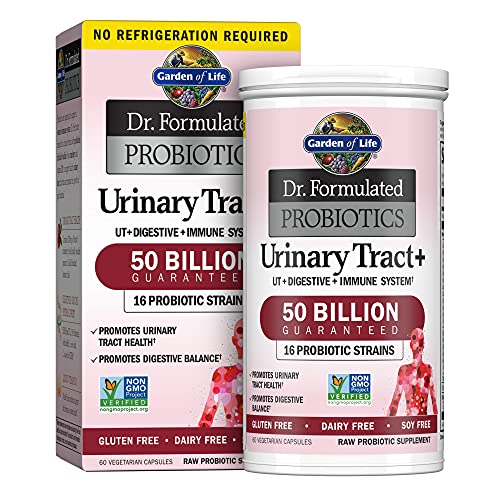
This probiotic supplement is specifically formulated by a doctor to provide essential support for urinary tract, digestive, and immune health. With 50 billion CFU, 16 probiotic strains, 500mg organic cranberry, 439mg organic prebiotic fiber, and 1,000 IU of Vitamin D3, this supplement provides comprehensive support in just two capsules per day.
The blend of probiotics in this supplement is backed by science and includes L. reuteri and L. acidophilus NCFM, as well as other clinically studied ingredients to support digestive, immune, and urinary tract health. Probiotics are an important way to support a healthy microbiome for women.
In addition to the probiotics, this supplement also includes 439mg of organic potato and organic acacia prebiotic fiber to help feed the good bacteria in the gut, 500mg of organic Pacran whole cranberry fruit for urinary tract health, and 1,000 IU of Vitamin D3 for immune health.
This supplement is shelf-stable and does not require refrigeration. The probiotic potency is guaranteed through expiration, even if the product is exposed to warmer temperatures during shipping. The supplement is manufactured following current good manufacturing practices (cGMPs) and is third-party certified non-GMO and gluten-free, so you can trust the quality of the product.
2. Healthy Gut Capsules: Florastor Probiotics
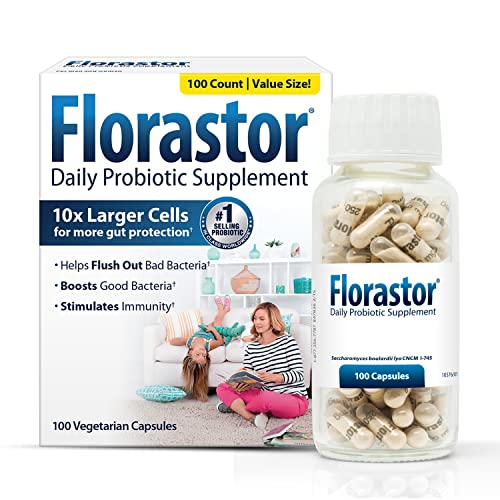
Florastor is a daily probiotic supplement that supports digestive and immune health by increasing the natural flora in your digestive tract. This unique probiotic strain contains 250mg of active cultures that are larger and stronger than many other probiotics on the market, providing increased intestinal coverage and protection.
One of the standout features of Florastor is its proven ability to resist antibiotic use. This resilient probiotic formula has been shown to thrive even during antibiotic treatment, with resistance to 16 of the most common oral antibiotics. Additionally, Florastor does not require refrigeration and has a shelf life of 3 years, making it an easy and convenient addition to your daily routine.
With over 65 years of research and use, Florastor is the number 1 probiotic in its class worldwide. Its unique and effective probiotic strain has been tested and proven to strengthen digestive balance and support a healthy immune system.
Florastor is made with high-quality ingredients that are suitable for a variety of dietary needs. It is vegetarian, gluten-free, and free of titanium dioxide, making it a healthy option for those with lactose intolerance.
3. Kid-Friendly Probiotic Powder For Optimal Health
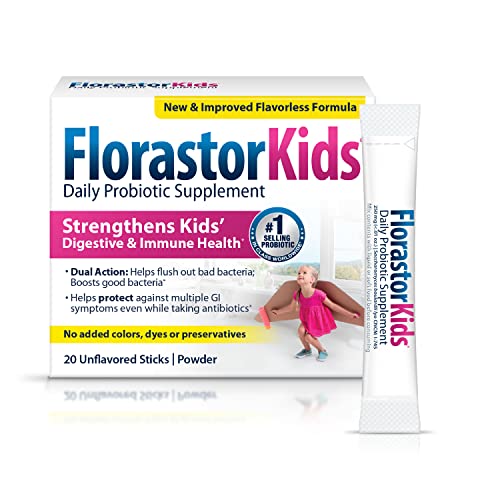
Florastor is an exceptional probiotic supplement that is designed to support your child's digestive and immune system. Its resilient formula is capable of thriving even during the use of antibiotics, as it has proven resistance to 16 of the most common oral antibiotics. Furthermore, Florastor has a 3-year shelf life and doesn't require refrigeration.
This daily probiotic supplement is perfect for kids of all ages, from 2 months and up. Each sachet contains the same dose as one Florastor capsule, and it is unflavored, making it easy to mix with food or drinks.
Florastor works by increasing the natural flora in your child's digestive tract, which helps to strengthen their digestive balance and support a healthy immune system. It is the number 1 probiotic in its class around the world, and its unique and highly effective strain has been researched and used for over 65 years.
Florastor is made with ingredients that are vegetarian, gluten-free, titanium dioxide-free, and appropriate for lactose intolerance. This makes it an ideal choice for parents who want to promote a healthy lifestyle for their children.
4. Advanced Probiotics For Gut Health

NewRhythm 50 Billion Probiotics is a powerful and natural supplement that supports digestive and immune health. Made in a GMP-certified facility in New York, USA, this probiotic supplement is formulated with 50 billion living organisms per serving and features targeted release technology to ensure that the probiotics survive stomach acids and reach your intestinal tract.
This scientifically backed and clinically proven formula is designed with 20 strains of probiotics, including organic prebiotics fiber, to help establish and maintain favorable intestinal flora. This potent and pure probiotic supplement provides powerful support for healthy digestion and balanced intestinal ecology, without any artificial ingredients or fillers.
NewRhythm 50 Billion Probiotics is made with 100% natural ingredients and is independently tested in 3rd party labs in the USA. It is verified non-GMO, gluten-free, and free of sugar, soy, yeast, egg, wheat, corn, peanuts, fish, shellfish, magnesium stearate, artificial ingredients, fillers, binders, and preservatives.
This probiotic supplement is shelf-stable and does not require refrigeration, making it easy to take on the go. NewRhythm is so confident in their product that they offer a 100% satisfaction guarantee. If for any reason you are not completely satisfied with your purchase, simply let them know within 30 days for a full refund.
5. Gut Bliss Probiotic Pearls – Digestive Health.
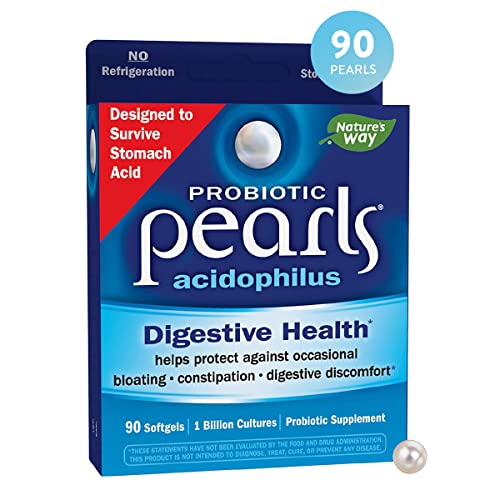
Probiotic Pearls Acidophilus is a daily supplement that contains 2 strains and 1 billion cultures in a once-daily softgel. This small, easy-to-swallow softgel helps protect against occasional bloating, constipation, and digestive discomfort. By providing L. Acidophilus for the small intestine and B. Longum for the large intestine (colon), this daily probiotic formula helps promote digestive balance and colon health, as well as support immune health.
To use, adults simply take 1 softgel daily. The small probiotic pearls are easy to swallow and conveniently sized to take anywhere and everywhere, with no refrigeration required. This makes it an ideal supplement for those who are always on-the-go.
Probiotic Pearls Acidophilus is made with wholesome ingredients and contains no salt, yeast-derived ingredients, wheat, or artificial colors. Nature’s Way, a trusted health partner, believes that healthy starts inside, with supplements that provide digestive support.
6. Globe Antibiotic Ointment: Wound Protection Essential
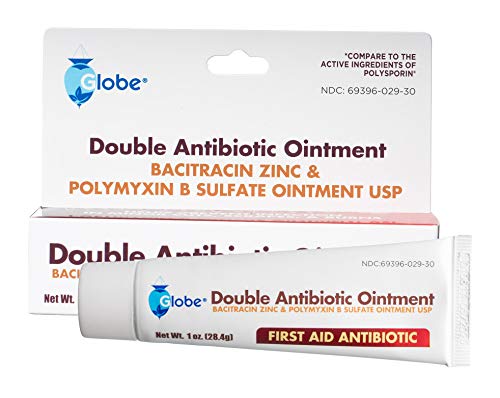
The Globe Double Antibiotic Ointment without Neomycin is a top-quality product that provides 100% infection protection for painful cuts, scrapes, and burns. Its active ingredients, Bacitracin and Polymyxin, are the same as those found in leading name brands, making it a reliable and effective choice for first aid treatment.
This ointment is a must-have in any first aid kit, and it's also easy to take with you wherever you go. The convenient tube size allows you to keep it in your medicine closet, car, camping bag, purse, kitchen drawer, kid's backpack, and even your travel carry-on luggage.
The Globe Double Antibiotic Ointment without Neomycin is suitable for a variety of skin care treatments, including minor cuts, scars, eczema, scraps, and burns. Its quality and ingredients ensure 24-hour protection against infection for minor cuts, scrapes, and burns.
7. Polysporin First Aid Antibiotic Ointment Without Neomycin, Travel Size, 1 Oz Tube
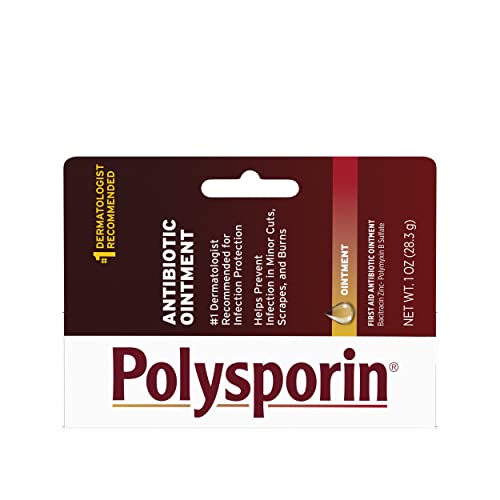
The Polysporin First Aid Antibiotic Ointment is a reliable solution for minor cuts, scrapes, and burns. It comes in a 1-ounce tube, making it easy to carry around and use whenever needed.
This topical antibiotic ointment is specifically designed to provide effective infection prevention for minor wounds. Its active ingredients work together to create a protective barrier that helps prevent bacteria from entering the affected area.
Using this wound care ointment is simple. All you need to do is apply a small amount of the ointment on the affected area 1 to 3 times daily. Its fast-acting formula helps soothe the wound and promote healing.
With the Polysporin First Aid Antibiotic Ointment, you can have peace of mind knowing that you are giving your minor wound the care it deserves. Its parameters and specifications make it a trustworthy choice for anyone looking for a reliable solution to minor cuts, scrapes, and burns.
8. Polysporin First Aid Antibiotic Ointment Without Neomycin, Travel Size, 1 Oz Tube
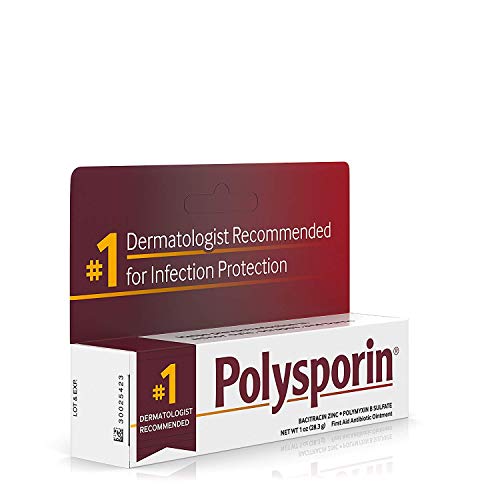
The Polysporin First Aid Antibiotic Skin Ointment is a go-to solution for effective wound care of minor cuts, scrapes, and burns. This 1-ounce tube contains a topical antibiotic ointment that helps provide effective infection prevention for minor wounds. This product is recommended by dermatologists as the #1 first aid ointment for infection prevention.
The Polysporin First Aid Antibiotic Skin Ointment is specially formulated to prevent infection in minor wounds. It combines the power of bacitracin zinc with polymyxin B sulfate and contains no neomycin. This topical antibiotic ointment helps provide effective infection prevention for minor wounds, making it an essential item for any first aid kit.
This product comes in a TSA-friendly travel size, making it convenient for on-the-go first aid and wound care. To use, simply apply a small amount of the wound care ointment to the affected area. For best results, clean the wound thoroughly before applying the ointment.
The Polysporin First Aid Antibiotic Skin Ointment is available in packs of 0.5 ounce tubes, making it easy to stock up for all your first aid needs. It is important to note that if this ointment is swallowed, medical help or contact with a Poison Control Center is necessary.
9. Nature's Way Probiotic Pearls Womens, 1 Billion Live Cultures, 30 Softgels
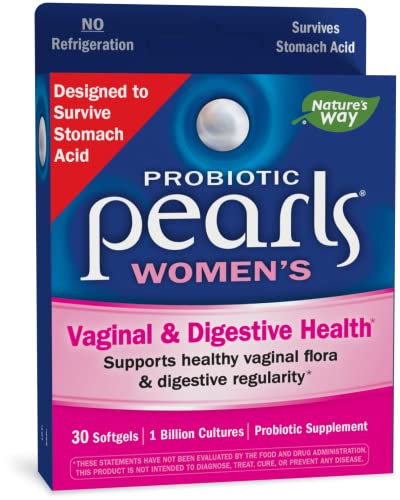
Nature's Way Probiotic Pearls for Women is a daily probiotic supplement designed specifically for women to support vaginal flora and urinary tract health. With 1 billion live probiotic cultures, Pearls Women's helps maintain vaginal and urinary tract health, while also supporting digestive balance and immune health with active Lactobacilli cultures.
The triple-layer coating of these probiotic pearls helps them survive their journey to the small intestine where they are needed the most. This ensures that the probiotics are able to provide maximum benefits to the body.
Women can easily incorporate this supplement into their daily routine by taking one softgel daily. The small size of the probiotic pearls make them easy to swallow and convenient to take on-the-go, without the need for refrigeration.
Nature's Way Probiotic Pearls for Women are made with wholesome ingredients and are gluten-free with no yeast-derived ingredients, wheat, salt, dairy, or artificial colors. This makes them safe for women with various dietary restrictions.
Nature's Way is a trusted health partner that believes in promoting health from the inside out by providing supplements that support digestive health. With Nature's Way Probiotic Pearls for Women, women can feel confident knowing that they are taking a high-quality supplement that supports their overall health and well-being.
10. Urinary System Cleanse – Clinical Strength Formula
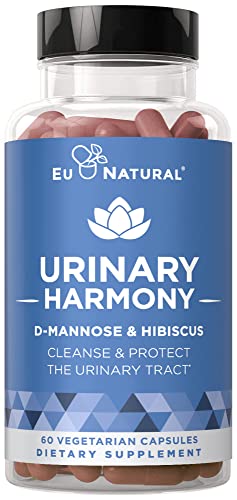
Introducing Urinary Harmony, a fast-acting supplement that supports urinary tract health and enhances comfort in as little as 7 days. This supplement is clinically-tested and has been shown to be a top alternative to cranberry supplements that may not be effective for everyone.
Urinary Harmony has a unique dual action formula that features a clinical dose of d-mannose and hibiscus extract. The blend works together to cleanse your urinary tract from unwanted bacteria, promote proper pH balance, and support long-term urinary and bladder wellness.
Unlike other supplements, Urinary Harmony contains only what you need and nothing you don’t. The capsules are made with a cGMP-certified blend that is completely free of fillers, binders, artificial ingredients, gluten, wheat, and animal testing for clean urinary support.
To use Urinary Harmony, simply take 2 easy-to-swallow vegetarian capsules daily with a meal and water. The capsules work to detoxify your system, flushing impurities from your urinary tract and improving overall urinary tract health.
When you purchase Urinary Harmony, you can feel good about your purchase because Eu Natural helps provide vitamins to women and children at risk for malnutrition. The company is proud to partner with Vitamin Angels and increase access to nutritional support for underserved pregnant women and children in need.
Best Antibiotic For Stomach Infection FAQs
Are there any natural remedies that can be used instead of antibiotics for stomach infections?
Yes, there are several natural remedies that can be used instead of antibiotics for stomach infections. One of the most effective natural remedies is probiotics, which are live bacteria and yeasts that are good for your health, especially your digestive system. Probiotics can help restore the balance of good bacteria in your gut, which can help fight off harmful bacteria that may be causing your stomach infection.
Other natural remedies that may help include ginger, which has anti-inflammatory and antibacterial properties, and can help soothe an upset stomach. Garlic is also known for its antibacterial properties and can help fight off infections. Apple cider vinegar can also be effective in treating stomach infections due to its antibacterial and antiviral properties.
It is important to note that while natural remedies can be effective, they may not always be a substitute for antibiotics in more serious cases. It is always best to consult with a healthcare professional to determine the best course of treatment for your specific stomach infection.
Are there any specific types of stomach infections that require a different type of antibiotic?
Yes, there are several types of stomach infections that require different types of antibiotics to treat effectively. For example, Helicobacter pylori (H. pylori) infection is a common cause of stomach ulcers and requires a combination of antibiotics such as amoxicillin, clarithromycin, and metronidazole. Another type of stomach infection is caused by Clostridium difficile (C. difficile) bacteria, which can lead to severe diarrhea and colitis. The treatment for C. difficile infection usually involves antibiotics such as vancomycin or fidaxomicin. Similarly, travelers’ diarrhea, caused by bacterial pathogens such as Escherichia coli, Salmonella, and Shigella, may require different antibiotics depending on the specific pathogen and its resistance patterns. It is crucial to consult with a healthcare professional to determine the specific type of stomach infection and the appropriate antibiotic treatment. Moreover, it is essential to complete the full course of antibiotics as prescribed by the doctor to ensure complete recovery and avoid the development of antibiotic resistance.
Can antibiotics be prescribed for stomach infections in children, and if so, what is the best option?
Yes, antibiotics can be prescribed for stomach infections in children, but it depends on the type of infection. Bacterial infections such as Helicobacter pylori, which can cause gastritis or peptic ulcers, can be treated with antibiotics. However, viral infections such as gastroenteritis, which are more common in children, cannot be treated with antibiotics and will usually resolve on their own within a few days.
The best option for bacterial stomach infections in children is to consult a pediatrician who can determine the most appropriate antibiotic based on the child's age, weight, and specific infection. Commonly prescribed antibiotics for stomach infections in children include amoxicillin, clarithromycin, and metronidazole. It is important to complete the full course of antibiotics as prescribed by the doctor, even if symptoms improve before the medication is finished.
It is also important to note that antibiotics should only be used when necessary and under the guidance of a healthcare professional, as overuse can lead to antibiotic resistance and other complications.
Can over-the-counter medications be used to treat stomach infections instead of antibiotics?
Over-the-counter medications are generally not effective in treating stomach infections caused by bacteria, as antibiotics are specifically designed to kill the bacteria causing the infection. Over-the-counter medications may provide symptomatic relief such as reducing stomach pain or nausea, but they will not address the underlying cause of the infection. It is important to note that self-medicating without proper medical advice can be dangerous and may lead to the development of antibiotic resistance. It is recommended to consult with a healthcare professional before taking any medication for a stomach infection. They can determine the appropriate treatment plan based on the specific type of infection and the severity of the symptoms. In some cases, antibiotics may be necessary to treat the infection and prevent it from spreading to other parts of the body.
How can I prevent stomach infections from occurring in the first place?
There are several ways to prevent stomach infections from occurring in the first place. First and foremost, it is essential to maintain good hygiene practices. Washing your hands regularly with soap and water before and after handling food, using the bathroom, and touching surfaces can help prevent the spread of harmful bacteria and viruses that can cause stomach infections.
Additionally, it is important to avoid consuming contaminated food and water. Always ensure that food is cooked thoroughly and stored properly to prevent the growth of harmful bacteria. Drinking clean and safe water is also crucial, especially when traveling to areas with poor sanitation.
Maintaining a healthy and balanced diet can also help boost your immune system, making it more resistant to infections. Avoiding excessive alcohol consumption and smoking can also help prevent stomach infections.
If you do experience symptoms of a stomach infection, such as diarrhea, vomiting, or fever, it is important to stay hydrated and seek medical attention if necessary. This will help prevent the infection from worsening and potentially leading to more severe health complications.
How long does it take for antibiotics to cure a stomach infection?
The length of time it takes for antibiotics to cure a stomach infection depends on several factors, including the type and severity of the infection, the specific antibiotic prescribed, and how well the individual responds to treatment. In general, most people begin to feel better within a few days of starting antibiotic therapy for a stomach infection. However, it is important to continue taking the medication for the entire prescribed course, even if symptoms improve or disappear. Failure to complete the full course of antibiotics may increase the risk of antibiotic resistance and recurrence of the infection. Depending on the severity of the infection, treatment can range from a few days to several weeks. It is important to follow the advice of a healthcare professional and to communicate any concerns or questions during the treatment process to ensure the best possible outcome.
Is it safe to take antibiotics for a stomach infection during pregnancy or while breastfeeding?
When it comes to taking antibiotics for a stomach infection during pregnancy or while breastfeeding, it is important to consult a healthcare professional before taking any medication. Antibiotics can be safe for both mother and baby, but it depends on the specific type of antibiotic and the individual's medical history.
Some antibiotics may have adverse effects on the developing fetus or the newborn baby, while others are considered safe to take during pregnancy or while breastfeeding. Your healthcare provider can evaluate your specific situation and recommend the most appropriate treatment option for you.
It is also important to follow the prescribed dosage and duration of the antibiotics, as well as any additional instructions provided by your healthcare provider. This will help ensure that the infection is properly treated while minimizing any potential risks to you or your baby.
In summary, while antibiotics may be necessary to treat a stomach infection during pregnancy or while breastfeeding, it is important to seek medical advice and follow proper precautions to ensure the safety of both mother and baby.
What are the potential side effects of antibiotics used to treat stomach infections?
Antibiotics are often prescribed to treat stomach infections such as Helicobacter pylori (H. pylori) and other bacterial infections. However, these drugs can have potential side effects, some of which can be severe. The most common side effects include nausea, vomiting, diarrhea, and abdominal pain. These symptoms may occur because antibiotics can disrupt the normal balance of bacteria in the stomach, leading to digestive upset.
In addition, antibiotics can also cause allergic reactions, such as hives, itching, and swelling of the face, lips, tongue, or throat. Rarely, antibiotics can cause severe allergic reactions, such as anaphylaxis, which can be life-threatening.
Another potential side effect of antibiotics is the development of antibiotic-resistant bacteria. Overuse of antibiotics can lead to the growth of bacteria that are resistant to treatment, making it more difficult to treat infections in the future.
It is important to talk to your healthcare provider about any potential side effects of antibiotics and to follow their instructions carefully. In some cases, alternative treatments may be available that can be just as effective with fewer side effects.
What is the most effective antibiotic for treating stomach infections?
The most effective antibiotic for treating stomach infections depends on the specific type of infection and the bacteria causing it. Some common types of stomach infections include Helicobacter pylori, which can cause peptic ulcers and gastritis, and Escherichia coli (E. coli), which can cause diarrhea and other gastrointestinal symptoms.
Typically, doctors will conduct tests to identify the specific bacteria causing the infection before prescribing antibiotics. Some commonly prescribed antibiotics for stomach infections include amoxicillin, clarithromycin, metronidazole, and tetracycline.
It's important to follow the prescribed treatment regimen, including finishing the full course of antibiotics as directed by your doctor. Failing to do so can lead to antibiotic resistance, making it more difficult to treat future infections. It's also important to note that antibiotics can have side effects, such as upset stomach, diarrhea, and allergic reactions. If you experience any concerning symptoms while taking antibiotics, be sure to contact your doctor.
What should I do if my symptoms worsen despite taking antibiotics for a stomach infection?
If you are experiencing worsening symptoms despite taking antibiotics for a stomach infection, it is important to contact your healthcare provider immediately for further assessment. Antibiotics are prescribed to treat bacterial infections, but if the infection is caused by a virus or other microorganism, antibiotics may not be effective. Additionally, some bacteria may become resistant to certain antibiotics, which can lead to treatment failure.
Your healthcare provider may recommend further testing to determine the cause of your symptoms and adjust your treatment plan accordingly. It is important to follow your healthcare provider's instructions and complete the full course of antibiotics as prescribed, even if your symptoms improve.
In the meantime, you can take steps to manage your symptoms, such as staying hydrated, avoiding foods that may irritate your stomach, and getting plenty of rest. If you experience severe symptoms such as high fever, severe abdominal pain, or vomiting, seek medical attention immediately.
